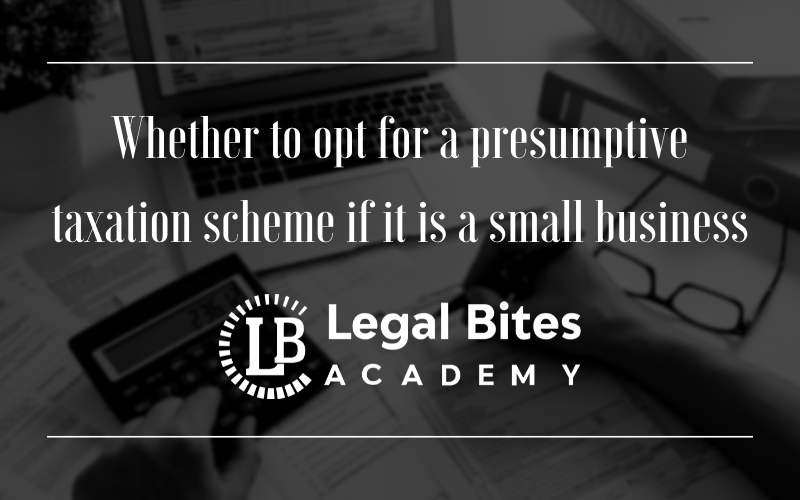Whether to opt for a presumptive taxation scheme if it is a small business
This article titled ‘Whether to opt for a presumptive taxation scheme if it is a small business.’ is written by Mayank Shekhar and discusses the relevance of a presumptive taxation scheme for small businesses. I. What is the Presumptive Taxation Scheme, and how does it work? The government has implemented a programme of Presumptive Taxation under sections 44AD, 44ADA, and… Read More »

This article titled ‘Whether to opt for a presumptive taxation scheme if it is a small business.’ is written by Mayank Shekhar and discusses the relevance of a presumptive taxation scheme for small businesses.
I. What is the Presumptive Taxation Scheme, and how does it work?
The government has implemented a programme of Presumptive Taxation under sections 44AD, 44ADA, and 44AE of the Income Tax Act 1961 to lessen the cost of different compliances. The assesses’ income is determined on a presumptive basis rather than on an actual basis under this arrangement.
If you use the presumptive taxation method, you may disclose your income at the stipulated rates. This programme is most likely to help small company owners, entrepreneurs, and professionals by relieving them of different obligations.
II. Benefits of a Presumptive Taxation System
- There is a deduction allowed under Chapter VI A. All deductions under sections 80C, 80D, 80 G, and others are included.
- Premiums for life insurance
- PF and PPF contributions
- Repayment of a mortgage
- Investments in certain mutual funds
- Participation in the NPS
- Interest on a home loan may be deducted.
- Filing a simple income tax return
III. What are the key aspects of PTS that make it ideal for small businesses?
- Small firms, such as traders, manufacturers, and contractors, may use the PTS.
- There is a different system in place. PTS is a programme for small goods movers.
- For small professions, there is a distinct PTS plan.
- Commission/brokerage agencies and life insurance agents are not eligible for the PTS. The total revenue should not exceed Rs. 2 crores.
- The plan is only available to resident taxpayers; non-resident taxpayers are not eligible.
- Individuals, HUFs, and partnership businesses are the only ones who can benefit from the plan.
- Once you’ve claimed PTS, you won’t be able to claim business deductions under sections 10, 10A, 10AA, or 80IB, for example.
IV. Depreciation on fixed assets is permitted in what way?
Although depreciation cannot be claimed against such fictitious company revenue, the assets are evaluated at the end of the year as if depreciation were permitted. For example, if your gross revenues are Rs.1,80,00,000/- and your presumptive income is Rs. 12,00,000/- for the fiscal year 2019-20, as shown in the diagram above.
If you have a building worth Rs.50,00,000/- that you use for business and may claim depreciation on, no depreciation will be permitted, but the write-down of the value of the property at the start of the following financial year will be Rs.45,00,000/- (by 10 percent less of the actual original value)
V. When do you have to pay your taxes?
One of the biggest benefits of PTS is that you don’t have to pay advance tax on every payment on the due date. You may only pay the whole tax on the 15th of March of the financial year, i.e. the final quarter of the financial year, in a single payment.
When compared to huge enterprises with enormous numbers of sales and buy transactions, small businesses and shop owners have a restricted number of consumers. In contrast to corporations and limited liability partnerships, these enterprises are generally run as sole proprietorships or partnership firms.
According to publicly available information, India has 60 million mom and pop shops. Small companies’ major transactions include sales and acquisitions of commodities, as well as store or building upkeep charges, as opposed to large firms’ complicated transactions and accounts.
Keeping this in mind, the Income-tax Act has made it illegal for small firms to keep books of accounts and have them audited by a licenced chartered accountant. These firms are simply needed to estimate their taxable profits/income at or above a specified percentage in order to submit their returns for income tax purposes.
Income tax authorities are unable to interrogate them about their books of account since they are not compelled to keep them or have them audited. A Presumptive Taxation Program is the name for this kind of scheme. Small enterprises and small professionals who are mentioned in the Income-tax Act are eligible for this Presumptive Taxation Scheme (PTS).


